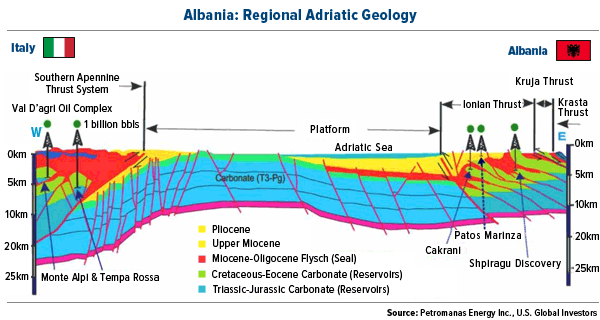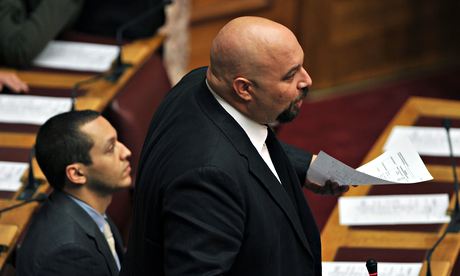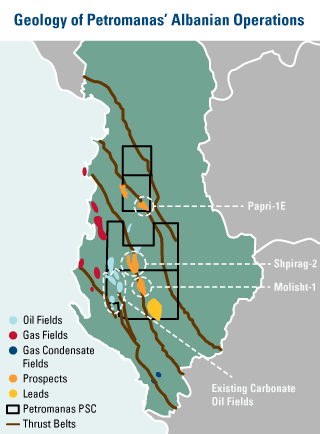Albania's Fertile Grounds For Oil Opportunities
Texas
is oil country. The state I now call home leads the nation in oil
production and would be one of the top oil-producing nations if it were
its own country. But that doesn’t stop us from exploring other promising
oil opportunities further afield. I recently traveled I traveled to
Albania to check out a drill site of Petromanas Energy, a Calgary-based
international oil and gas company focused on exploration and production
throughout Europe and Australia. We own the junior stock in our Global
Resources Fund (PSPFX) and Emerging Europe Fund (EUROX).
To
many, Albania is an unknown country yet it has a rich and interesting
history. It declared independence from the Ottoman Empire in 1912, was
conquered by Italy in 1939 and occupied by Germany in 1943. Albania
allied itself with the USSR until 1960 and then with China until 1978.
Democratic development has progressed since the country’s first
multiparty elections in 1991. The 2009 general elections resulted in the
country’s first coalition government and the 2013 election saw a
peaceful transition of power. A parliamentary democracy, the country has
steadily been welcoming foreign direct investment (FDI) since it
shifted away from communism in the early 90s. The recent FDI into the
country comes on the back of the extensive development of its rich
petroleum resources.
Third Time’s a Charm
This was my third trip to Albania. I last visited the country in 2004
when we were seed investors in another oil play there, Bankers
Petroleum. Today Bankers’ Albanian discovery is the largest onshore
oilfield in all of Europe. The company is now close to 40 percent of
Albania’s FDI and is reinvesting all cash flow back into the country,
about $300 million per year. Bankers has done an amazing job cleaning up
the environmental disaster left behind by previous operators of the
assets which Bankers is developing. Today the fields are green and sheep
roam freely. Old and dirty early rigs have been replaced with new
safer, cleaner technology.
So much has changed since my last visit.
The country is more prosperous and more verdant. Capital city Tirana’s
infrastructure and roads have improved by a quantum leap in the past 10
years. Every morning I ran in Rinia Park, the large central public park,
with Marin Katusa of Casey Research. We were impressed with the
hundreds of locals jogging at 7 a.m.
Meeting A Man of Many Colors On
this visit I was honored to meet the Prime Minister of the country
since 2013, Edi Rama, who also served as the mayor of Tirana from 2000
to 2011. He is a fascinating leader. Rama is a native of Tirana and, in
addition to becoming involved with the first democratic movements in
Albania, he is an artist and a former basketball player for the Albanian
national team. He is, to a large degree, responsible for the vibrancy I
saw in Tirana, his Clean and Green project resulting in nearly 100,000
square meters of green land and parks, and his creative efforts to use
art and color helping to curb corruption and revive civic pride and
responsibility.
You’d enjoy watching him explain this dramatic transformation in his TED talk
Take Back Your City with Paint.
Rama has helped form a stable political environment in Albania, just
one reason Petromanas Energy has invested in drill sites here.
Fertile Ground for Oil and Gas
The company’s assets in Albania cover more than 1.1 million gross
acres. In the company’s presentation during our visit, management
explained why Albania’s landscape is also key. Petromanas is exploring
for large, deep, fractured carbonate structures of Eocene-Cretaceous
age, similar to those in southern Italy which are the sites of several
prolific oil fields.

Greek 10-Year Government Bond Yields Back to Pre-Crisis Levels
Located
across the country’s Berati thrust belt, you can see the multiple wells
in the map below: Papri, Shirag and Molisht. Petromanas is looking for a
light oil deposit in these wells. Super major Royal Dutch Shell has
invested $200 million to partner in these plays.
While at
Petromanas properties, our group saw a few of these wells, but most
notable was the visit to the Molisht-1 well that is currently being
drilled. As Keith Schaefer points out in his recent
Oil and Gas Investments Bulletin
on the Albania trip, the Molisht-1 well has the potential to be an
8,000-10,000 barrels of oil production per day well, an absolute company
maker. And according to Petromanas’ presentation, the Molisht-1 well
could potentially hit earlier than expected, which would be a positive
surprise for the company.
What do the founder of Lionsgate Entertainment and a former NATO Commander have in common?
Petromanas
Energy is an example of a company that is currently in a strong area of
the market and exhibits robust fundamentals. Its management, research
and location are only a few reasons I see great potential for this
organization. Escorting us on the research trip were two of the
company’s directors, my good friend the legendary Canadian venture
capitalist and philanthropist extraordinaire Frank Giustra, and General
Wesley Clark, who as the former Supreme Allied Commander Europe, led the
charge to stop Serbian forces from committing genocide in Kosovo. I’ve
also had the privilege of working alongside these distinguished
gentlemen with the International Crisis Group, a non-profit,
non-governmental organization committed to preventing and resolving
deadly conflict around the world.
The Path from War to Peace and Prosperity in 20 Years Albanians
and their Balkan neighbors have seen more than their share of conflict.
The trigger for World War I was the assassination in Sarajevo of
Archduke Ferdinand, heir to the throne of Austria-Hungary, by a Yugoslav
nationalist in 1914. The Yugoslav Wars fought from 1991 to 1999 on the
territory of former Yugoslavia have been described as Europe’s deadliest
conflict since World War II and the first since the Great War to be
formally judged genocidal. It is estimated at least 130,000 lost their
lives. In the last of these ethnic conflicts, the Kosovo War, a million
ethnic Albanians fled or were forcefully driven from Kosovo by Yugoslav
troops. Under the command of General Clark, NATO forces bombed Serbian
forces to prevent the continued displacement and persecution of the
Albanian people.
Prime Minister Rama told us that he is
profoundly grateful to the American people, President Clinton, and NATO
for saving the lives of at least 900,000 Albanians and ushering in
stability and positioning the region for progress. It was a case study
in the successful use of force to bring peace to a region and a
consequent drive for prosperity for its people. Our collective
investment in this humanitarian success story is paying dividends for a
new generation of Albanians. The country’s transition to a free market
economy has been difficult and there are many economic challenges on the
road ahead but the government believes in creating a path favorable for
business. Companies such as Bankers Petroleum and Petromanas are
helping Albania to develop its natural resources, improve its economy
and create growth opportunities for investors who see the potential of
this resilient country.
Disclaimer: Please
consider carefully a fund’s investment objectives, risks, charges and
expenses. For this and other important information, obtain a fund
prospectus by visiting www.usfunds.com or by calling 1-800-US-FUNDS
(1-800-873-8637). Read it carefully before investing. Distributed by
U.S. Global Brokerage, Inc.
Past performance does not guarantee future results.
Foreign
and emerging market investing involves special risks such as currency
fluctuation and less public disclosure, as well as economic and
political risk. Because the Global Resources Fund concentrates its
investments in a specific industry, the fund may be subject to greater
risks and fluctuations than a portfolio representing a broader range of
industries.
By investing in a specific geographic region, a regional
fund’s returns and share price may be more volatile than those of a
less concentrated portfolio. The Emerging Europe Fund invests more than
25% of its investments in companies principally engaged in the oil &
gas or banking industries. The risk of concentrating investments in
this group of industries will make the fund more susceptible to risk in
these industries than funds which do not concentrate their investments
in an industry and may make the fund’s performance more volatile.
Fund
portfolios are actively managed, and holdings may change daily.
Holdings are reported as of the most recent quarter-end. Holdings in the
Global Resources Fund as a percentage of net assets as of 3/31/14:
Bankers Petroleum 0.00%, Petromanas Energy 0.05%, Royal Dutch Shell
0.00%. Holdings in the Emerging Europe Fund as a percentage of net
assets as of 3/31/14: Bankers Petroleum 0.00%, Petromanas Energy 0.18%,
Royal Dutch Shell 0.00%.
All opinions expressed and data provided
are subject to change without notice. Some of these opinions may not be
appropriate to every investor.







 159 Comments
159 Comments

















 Pro-Russian militants stand guard in front of a seized district state
building in the eastern Ukrainian city of Donetsk (Alexander Khudoteply/
Getty)
Pro-Russian militants stand guard in front of a seized district state
building in the eastern Ukrainian city of Donetsk (Alexander Khudoteply/
Getty)





